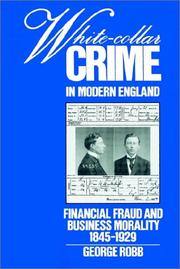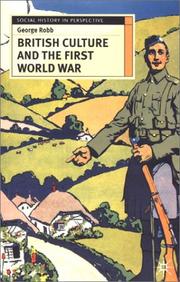| Listing 1 - 4 of 4 |
Sort by
|

ISBN: 052141234X 0521526124 0511522789 Year: 1992 Publisher: Cambridge : Cambridge university press,
Abstract | Keywords | Export | Availability | Bookmark
 Loading...
Loading...Choose an application
- Reference Manager
- EndNote
- RefWorks (Direct export to RefWorks)
In the period between the 1840s and the 1920s the British economy was transformed, from small-scale capitalism dominated by individual traders and partnerships to a complex financial structure dominated by large, joint-stock companies. The tremendous growth of big business created a world of new opportunities for criminal exploitation. The promotion and management of public companies and the trading of commercial securities proved vulnerable to the white-collar crimes of fraud and embezzlement. Problems of financial fraud were exacerbated by a climate of laissez-faire which championed the most permissive commercial legislation in the world, and white-collar crime wreaked havoc on the modern British economy. This new book examines the spread of white-collar crime from the Victorian period to the early twentieth century and offers a new perspective on modern scandals.
343.91-057.3 --- Commercial crimes --- -Commercial crimes --- -Securities fraud --- -343.53 <41> --- Stock fraud --- Fraud --- Corporate crime --- Crimes, Financial --- Financial crimes --- Offenses affecting the public trade --- Crime --- Witteboordcriminaliteit. White-collar criminaliteit --- History --- -History --- -Commerciele fraude. Industriele fraude. Ongeoorloofde concurrentie--Verenigd Koninkrijk van Groot-Brittannië en Noord-Ierland --- Securities fraud --- 343.53 <41> Commerciele fraude. Industriele fraude. Ongeoorloofde concurrentie--Verenigd Koninkrijk van Groot-Brittannië en Noord-Ierland --- Commerciele fraude. Industriele fraude. Ongeoorloofde concurrentie--Verenigd Koninkrijk van Groot-Brittannië en Noord-Ierland --- 343.91-057.3 Witteboordcriminaliteit. White-collar criminaliteit --- 343.53 <41> --- Arts and Humanities

ISBN: 0333715713 0333715721 Year: 2002 Publisher: Houndmills : Palgrave,
Abstract | Keywords | Export | Availability | Bookmark
 Loading...
Loading...Choose an application
- Reference Manager
- EndNote
- RefWorks (Direct export to RefWorks)
World War, 1914-1918 --- Literature and the war. --- Art and the war. --- Influence. --- Great Britain --- History --- Social conditions --- Civilization
Book
ISBN: 033372562X Year: 1999 Publisher: Houndmills : Macmillan,
Abstract | Keywords | Export | Availability | Bookmark
 Loading...
Loading...Choose an application
- Reference Manager
- EndNote
- RefWorks (Direct export to RefWorks)
Book
Year: 1971 Publisher: Hinsdale (Ill.) : Dryden press,
Abstract | Keywords | Export | Availability | Bookmark
 Loading...
Loading...Choose an application
- Reference Manager
- EndNote
- RefWorks (Direct export to RefWorks)
| Listing 1 - 4 of 4 |
Sort by
|

 Search
Search Feedback
Feedback About UniCat
About UniCat  Help
Help News
News